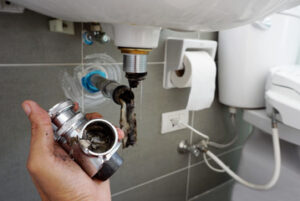Plumbing is a system of pipes and fixtures that distributes water and removes waste in buildings. It includes the distribution of fresh water and drainage, as well as the venting system.

Plumbers are in high demand and offer competitive salaries. It is also a hands-on, problem-solving job that can provide a satisfying career.
Plumbing is a vital service that ensures clean water for household use and removes waste to maintain a hygienic environment. It is a complex system that includes pipes, fixtures and other materials that carry water to and from sinks, toilets, showers and more. Understanding how it works can help you avoid common plumbing problems, like leaks and flooding.
Plumbing work is a skilled trade that requires knowledge of engineering principles to design, build and maintain piping systems in buildings. It also involves knowing the right approaches to take while connecting a house piping system with public systems such as water supply and sewerage. It is important to understand these basics to avoid mistakes that could lead to huge expenses in the future. These mistakes can cause health hazards as well as environmental pollution.
It’s a Good Paying Job
Plumbing is the system of pipes and fixtures that conveys water and sewage throughout buildings. It is a vital part of contemporary living and requires regular maintenance to function properly and avoid water damage and other issues. The basic elements of a plumbing system include water heaters, faucets, sinks, showers, toilets, and other apparatuses that provide clean drinking water and remove waste to maintain a hygienic environment. A plumber is a person who is skilled at installing and maintaining these systems, and has the knowledge to troubleshoot problems when they arise. This is a high demand profession with good pay and career prospects.
It’s a Good Career
Plumbing isn’t the most glamorous job, but it’s one that makes a real difference. People need plumbers to fix their sewer systems, clean their drains, and work in crawl spaces and attics. Whether they’re bringing in fresh water from the city or installing gas lines for new appliances, plumbers are making sure that billions of people have safe and healthy places to live.
There are also a lot of different careers in the plumbing industry, so there’s something for everyone. If you’re interested in a more creative and hands-on career, pipe/steamfitter might be the right choice for you. These plumbers design, build, and maintain pipes that transport water, steam, and natural gas. They often work in industrial applications and oil or gas extraction, so it’s a very diverse field.
Another option is new construction plumbing. This is when a plumber works on new construction projects and installs the plumbing systems before the building is finished. The work is more structured than service plumbing, but it still offers a good income. Some plumbers even go on to become project managers or lead technicians for large plumbing companies.
Finally, some plumbers choose to move into sales and promote the products they sell to contractors, builders, and customers. This is a lucrative and rewarding position that allows them to use their experience and expertise in a different setting.
While many professions are being threatened by automation, it seems like plumbing is a trade that will continue to be in demand for the foreseeable future. As more and more baby boomers retire, it’s important that younger people get into the trades so that there are enough experienced plumbers to keep the business running. It’s also a great career choice for anyone who wants to learn on the job and earn a decent living while they do it. This is especially true if they take the time to become Red Seal certified.
It’s a Good Work Environment
While the image of a plumber might conjure up images of men in overalls repairing toilets, plumbing is much more than that. It’s about the distribution of clean water and the proper disposal of waste to protect our health and safety. Plumbers are responsible for ensuring that these systems are working properly, so they can keep us from contracting dangerous water-borne diseases.
For those looking for a satisfying career, plumbing is a good choice. It provides a steady job market, opportunities for specialization and advancement, and the ability to make a difference in society. The demand for plumbers remains steady, even during economic downturns. In addition, the pay for plumbers is competitive.
In addition to these benefits, plumbing offers a great work environment. It is a hands-on, problem-solving trade that can be satisfying for those who enjoy interacting with people and solving puzzles. It’s also a physically demanding career that requires manual labor, lifting heavy equipment, and working in tight spaces.
Those interested in becoming a plumber can pursue their training through vocational and community colleges, which are usually cheaper than a four-year college degree. Additionally, many companies offer apprenticeship programs that allow aspiring plumbers to earn while they learn the trade. This can help a plumber start their career with little or no debt, unlike the average recent college grad who graduates with massive student loan debt.
Another positive aspect of a plumbing career is the opportunity to build relationships with clients. Plumbing is a service-oriented industry, so it’s common for plumbers to interact with customers on a daily basis. These interactions can lead to long-term client relationships that generate revenue for plumbers. This can be especially beneficial for plumbers who work in the residential sector, where customers often turn to them for maintenance and repair services.
The need for skilled plumbers is universal, so there are always opportunities for those willing to invest in the training required. In addition, the flexibility of the plumbing industry allows for opportunities to find new ways to solve old problems and develop innovative solutions.
